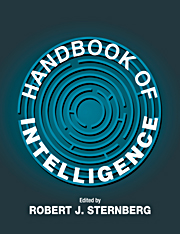Book contents
- Frontmatter
- Contents
- Preface
- Contributors
- PART I THE NATURE OF INTELLIGENCE AND ITS MEASUREMENT
- PART II DEVELOPMENT OF INTELLIGENCE
- PART III GROUP ANALYSES OF INTELLIGENCE
- PART IV BIOLOGY OF INTELLIGENCE
- PART V INTELLIGENCE AND INFORMATION PROCESSING
- PART VI KINDS OF INTELLIGENCE
- PART VII TESTING AND TEACHING INTELLIGENCE
- PART VIII INTELLIGENCE, SOCIETY, AND CULTURE
- PART IX INTELLIGENCE IN RELATION TO ALLIED CONSTRUCTS
- 26 Intelligence and Personality
- 27 Intelligence and Creativity
- 28 Intelligence and Wisdom
- Author Index
- Subject Index
28 - Intelligence and Wisdom
Published online by Cambridge University Press: 05 June 2012
- Frontmatter
- Contents
- Preface
- Contributors
- PART I THE NATURE OF INTELLIGENCE AND ITS MEASUREMENT
- PART II DEVELOPMENT OF INTELLIGENCE
- PART III GROUP ANALYSES OF INTELLIGENCE
- PART IV BIOLOGY OF INTELLIGENCE
- PART V INTELLIGENCE AND INFORMATION PROCESSING
- PART VI KINDS OF INTELLIGENCE
- PART VII TESTING AND TEACHING INTELLIGENCE
- PART VIII INTELLIGENCE, SOCIETY, AND CULTURE
- PART IX INTELLIGENCE IN RELATION TO ALLIED CONSTRUCTS
- 26 Intelligence and Personality
- 27 Intelligence and Creativity
- 28 Intelligence and Wisdom
- Author Index
- Subject Index
Summary
INTELLIGENCE AND WISDOM
Some people, like Mohandas Gandhi or Nelson Mandela, radiate both intelligence and wisdom. Other people, like Joseph Stalin or Adolph Hitler, seem to have been intelligent in a narrow sense, but certainly were not wise. Still others seem to be wise but perhaps not conventionally intelligent: Many of us have known older people, perhaps relatives, who have shown their wisdom but who have not shown the kinds of achievements or talents typically associated with conventional intelligence. And of course, there are many people who are neither wise nor intelligent. Given all the possible relations we see in people between wisdom and intelligence, just what is the nature of their interrelation?
Theories of intelligence seem to have little to say about wisdom. Regardless of the metaphor of mind underlying the theory of intelligence (Sternberg, 1990a), wisdom seems to be viewed as outside the purview of the large majority of theories of intelligence. But intelligence plays an important role in many theories of wisdom (see Sternberg, 1990b). In this chapter, I will consider the interrelation between the two, suggesting that the asymmetry in reference across the two literatures results from wisdom being a special case of a special kind of intelligence, practical intelligence. One possibly can discuss intelligence without dealing with wisdom, but one cannot adequately discuss wisdom without dealing with intelligence.
Wisdom can be defined as the “power of judging rightly and following the soundest course of action, based on knowledge, experience, understanding, etc.” (Webster's New World College Dictionary, p. 1533).
- Type
- Chapter
- Information
- Handbook of Intelligence , pp. 631 - 650Publisher: Cambridge University PressPrint publication year: 2000
- 36
- Cited by



